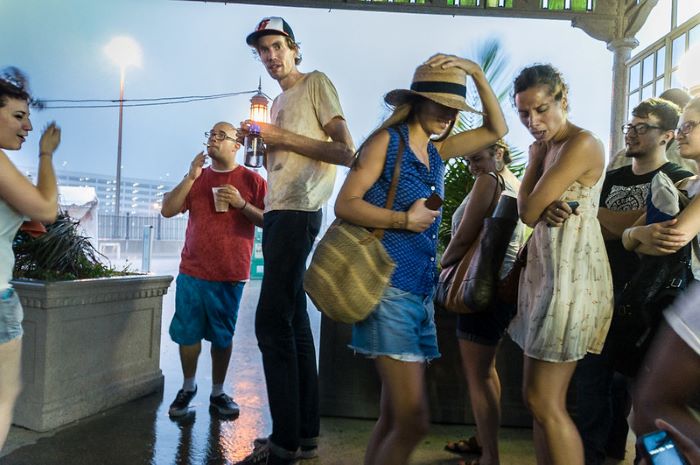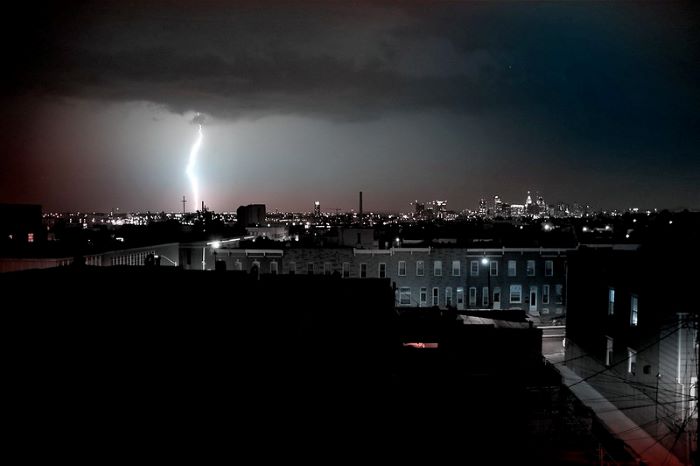
I have nothing good to say about Baltimore in August. Ok, the farmers’ market is moving into high season, peaches & tomatoes, also okra — that’s good. Digression: I spent childhood on a small farm in the midwest making internal proclamations and declarations about freezing beans and canning applesauce in a hot kitchen, like, if I ever get outa here I’m never doing this again, not me. Until decades later, I ran into the irrevocable fact that peaches and tomatoes have a few-weeks’ season and the rest of the year aren’t worth eating, so now I’m freezing peach crisp and tomato sauce and apologizing to the sweaty irritated young Ann. Anyway, I think that’s it for anything good about Baltimore in August.
The sun is out, temperatures are in the 90s and dew points are in the 70s, dew points being the temperature at which water condenses out of the air so that was 20 degrees ago — meaning that gills would have been the better evolutionary option here because the air is 52.76% water. At these dew points, the air is holding all the water it can so you can’t cool by sweating; these dew points, says our beloved Capital Weather Gang, are not just oppressive but offensive and “very gross.” Digression: I asked a neighbor who was a public health scientist just back from equatorial Africa what it was like there and she said, “About like here.”
Nights might get down to the upper 70s, same dew points; another neighbor had a friend visiting from California ask when the evening would cool off, and the neighbor just snorted. Digression: once I asked my gyn when I was going to stop having hot flashes and she too just snorted. So anyhow, that’s the Baltimore days and nights.

The afternoons, however, are terrifying, due to a hair-raising alliance between physics and chemistry. More heat means more action in the air and less density, meaning as we all know, that hot air rises. More water — for chemistry reasons having to do with molecular weight that I don’t understand — also means less density, also rising. So whooop, up she goes, wet hot air, rising rising, juicing up the atmosphere, and the more juice, the more convective instability — digression: I read that phrase first as “collective instability” which, yes, we are, aren’t we — which is measured as CAPE, Convective Available Potential Energy, the operative words being “potential energy.” Because that wet hot air rises up into the high atmosphere where it’s cooler, then condenses and carries all that juicy potential energy into thunderheads which grow crazy big, bigger every minute, blooming over the city like an alien invasion.
And inside those thunderheads, all the molecules and things get charged and the electric fields get more intense and the energy that’s been potential now just lets loose, the fields discharge and become lightning, also in a way I don’t understand but neither do scientists. Lightning heats the air to 55,000 degrees until the air explodes into thunder, and the closer in time the lightning is to the thunder, the more it seems personal. Digression: a neighbor and I were on his porch, the neighbor holding his cat, and a simultaneous lightning/thunder hit, CRACK BAM, and the cat (also) exploded out of my neighbor’s hands, and the rest of my life I’ll remember that cat, feet outstretched, hanging like a bat in the air above us.
Anyway, afternoons in Baltimore: watchful anxiety, the thunderheads get bigger, the chances of storms go up and up until finally and with some probability all hell breaks loose, physics and chemistry unconstrained by human desires.
Windows rattle, transformers blow up, trees crash down, the power goes out — recently for days — and so does the AC, and you sit there in the dark in a puddle of your own sweat if you can even sweat. Streets flood, and the Capital Weather Gang repeatedly tweets TURN AROUND DON’T DROWN; flights are delayed, then cancelled, then you can’t get home until the afternoon of next Thursday when thunderstorms will again be likely — these weather patterns are stable — and flights will be cancelled again.
The best you can say about Baltimore is that it’s not in the midwest where cells of convection become supercells and your house gets blown into the next county. So I guess that’s a second good thing about August in Baltimore — catastrophes here, as with so much else, are not sensational; here we have only unassuming Armageddons.
_________
Chuck Patch via Flickr Creative Commons: Baltimore’s Artscape, when it’s so routinely hot and/or rainy, it’s called Artscape weather.
Yianni Mathioudakis, also Flickr Creative Commons: also Baltimore
It’s hasn’t been much different 110 miles northeast of you in Philadelphia, except we are here on the “fall line” so the disturbances are much more spectacular.
You’re right, Ed, the weather is pretty much the same for the whole mid-Atlantic. And you said, “fall line,” which was a mistake because I have a LOT to say about that.
Live in the Pacific Northwest!
Certainly in the PNW the company would be good.
I remember attending an International Astronomical Union meeting in the 1980s in Baltimore. I was sitting having lunch and looked out across the street where the temperature gauge read 104. I thought, my god, how can people live here? I grew up where it did not get hotter than 75 or so in the summer. If it got to 80, we suffered. Well, I now live in Texas and still think, my god, how do people live here? Davy Crockett’s quote has special meaning to me now: “You may all go to hell, and I will go to Texas.” I never quite understood the quote as it has a double meaning. But I know what I think it means to me.
I don’t know how people live in Texas either, Nick. I do know that people who tell me that the southeast’s heat is dry and not as insufferable are just lying.
I didn’t realize Baltimore was on the fall line. I live to the immediate east of a filled-in mill pond( filled in the 1920s and 30s with clinker and ash and god knows what). A Hundred years later, utility repairs have been ongoing for the last 40 years.
Picking up hay bales during a Tennessee August seemed easier than these Baltimore afternoons, but that’s probably more a consequence of my age than anything else.